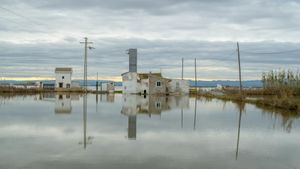COP29 is underway in Baku, Azerbaijan, and the climate crisis is feeling more immediate than ever. From intensified hurricanes to drought-fueled wildfires, the challenges posed by climate change are part of daily life for many communities globally. But amid these pressing challenges, there's still room for hope and action. Understanding what needs to be done can sometimes feel overwhelming due to the constant flow of climate updates and scientific research. That's where the ABC News Climate and Weather Unit steps in, providing clarity and concise updates needed to navigate today’s complex climate realities.
At the heart of COP29 is a pressing question: How much will it cost to combat climate change worldwide, and who's going to foot the bill? This year's conference, dubbed the "finance COP," takes on additional weight as it kicked off amid major political shifts worldwide, especially following the recent presidential elections in the U.S.
While discussions are broad, the focus this year zeros in on finance. Delegates will tackle how much external support will be available for developing countries to adapt to climate impacts and compensate for damage already inflicted by climate change. It’s important to recognize the disparity: wealthier nations are the largest contributors to greenhouse gas emissions, yet it is the poorer countries who suffer the most from climate crises.
The stakes are high. Current targets suggest around $100 billion is needed annually, yet the United Nations estimates the real figure could skyrocket to $2.4 trillion by 2030 to truly meet our climate goals. The burden of financing this transition largely falls on wealthier nations, yet uncertainty looms over how much each will contribute—a situation yielding significant tension at COP29.
Melanie Robinson, the global climate, economics, and finance program director at the World Resources Institute, emphasized the dire need for adaptation finance to come through as grants or concessional forms for the poorest nations. Adding to the complexity is the contentious discussion over whether developing countries with more resources should also contribute financially to the climate fight.
U.N. Climate Change Executive Secretary Simon Stiell set the tone for this year's discussions with stark reality checks about the global economy's fragility. “If at least two-thirds of the world’s nations cannot afford to cut emissions quickly, then every nation pays a brutal price,” he warned the assembly.
This year's COP takes place against the backdrop of major changes to the political climate, most pivotally exemplified by the recent U.S. presidential election outcomes. Those outcomes have raised valid concerns about the U.S. commitment to global climate goals. At the conference, U.S. Climate Envoy John Podesta expressed disappointment about the election results but remained resolute. “For those of us dedicated to climate action, last week’s outcome is obviously bitterly disappointing,” he told reporters.
Podesta remarked on the distinct possibility of the subsequent administration seeking to reverse the progress made under the Biden administration, including pivotal policies like rejoining the Paris Agreement and the environmental initiatives funded by the Inflation Reduction Act.
Despite these uncertainties, Podesta remained firm, stating, “This is not the end of our fight for a cleaner, safer planet.” He reinforced the notion of climate action extending beyond political cycles. “The fight is bigger than one election, one political party, or one country. We are facing global challenges, and we cannot allow political tides to undermine the actions needed to face them,” he asserted.
Podesta pointed to the stark realities and impacts of climate change seen this year alone, from extreme heat waves to devastating hurricanes, flooding, and severe droughts affecting millions worldwide. He cautioned against viewing climate finance as charity, urging countries to see the collective effort needed as one of mutual interest. “An ambitious new climate finance goal is entirely within the self-interest of every nation, the largest, the wealthiest, and the poorest,” he stated.
Meanwhile, the conference has faced its own operational hurdles. Delegates found themselves stalled on the first day due to disagreements over the agenda, particularly about leading financial planning meetings. Mukhtar Babayev, the COP29 president, echoed the urgent need for collaboration. “The hour is late; we have much work to do,” he urged as discussions resumed after these delays.
Outside the halls of the conference, innovative solutions to global food waste are gaining attention, as demonstrated by initiatives at universities like Georgia State University. Student Erin Murphy sought to address alarming food waste statistics on her campus, leading to the implementation of AI technology called “Raccoon Eyes.”
This advanced system tracks food waste effectively, providing real-time data on the amounts of food left uneaten on students’ plates. Food waste is often considered one of the leading environmental concerns, with the U.N. estimating over one billion tons of food wasted annually, contributing to greenhouse gas emissions as it decomposes.
Through Raccoon Eyes, researchers have discovered significant trends, such as excessive amounts of French fries being commonly wasted—a sign of portion sizes needing adjustment. The program has also already achieved initial success, reducing overall food waste on campus by 23% since its inception.
This focus on waste also connects back to the broader climate narrative being woven at COP29, where funding isn’t just directed toward climate adaptations but also encompasses innovations and technology promising transformative change.
While the road to meaningful climate action remains fraught with obstacles, both political and operational, the determination of climate advocates everywhere, particularly at international conferences, shows no signs of diminishing. Whether it’s finding solutions to food waste or financing climate responses for developing nations, the collective effort is grounded in necessity and urgency. The fight against climate change is undoubtedly global, and the message is clear: every nation has its role to play, and complacency is simply not on the agenda.



